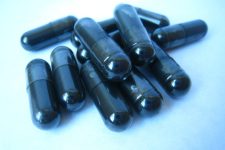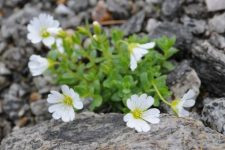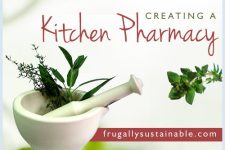In the simplest of terms a tincture is a concentrated liquid extract made from herbs.
Tincturing herbs is another safe and effective way to preserve fresh, homegrown herbs…one that our ancestors knew very well. It captures the medicinal properties of the plant material and extends their shelf life significantly.
The empowerment and sense of satisfaction you will receive after preparing herbs using this traditional method is extremely rewarding!
Tincturing Basics
In order to provide you with a visual description, I created this quick video that shows you just how easy tincturing your homegrown herbs can be…
Have you created tinctures in the past? What about this season, are you planning to tincture any herbs? Share any question you have regarding tincturing in the comments so that we can all help each other!
Be sure not to miss a single post in the series…click this link and subscribe to the blog.




 Creating a Kitchen Pharmacy: Traditional Methods of Preserving Homegrown Herbs
Creating a Kitchen Pharmacy: Traditional Methods of Preserving Homegrown Herbs
I am really enjoying this! Thank you!
Thank you Clint. I’m really glad that you are finding the information useful!
Thank you so much! I enjoyed your video and I’m going to print off your pdf right now. Time to start my herbal journal.
Horray 🙂
Great video, Andrea! I enjoyed it so much! How do you dose the tincture? Do you take it a teaspoon at a time? Or add it to tea? Do you take it when you feel the twinges of a cold coming on?
Great question Rachel! I’m actually planning an entire post on dosaging after we review all of the different ways to prepare herbal medicines — i.e. tincturing, oil infusions, salve making, pill making, teas, and syrups — so as to have all of that information in one post. But to answer your question concerning tinctures, here are the basics:
-acute symptoms (sudden onset) = 1/4-1/2 tsp of tincture every 30 min. to an hour not to exceed 6 tsp. in 24 hours
-chronic symptoms (long standing health issues) = 1/2-1 tsp of tincture 2-3 times per day not to exceed 3 tsp. in 24 hours
-for children I use “Young’s Rule” of dosing which says to add 12 to the child’s age; then divide the child’s age by that number. For example my daughter is 6…therefore my formula looks like this 6/18=0.33. She receives 33% of an adult dose.
Like I said, we’ll go over this more in a couple of days, but I hope this helps 🙂
That’s so cool that you brought up Young’s rule. I have been learning about it and Clark’s rule for dosing children’s meds in my tech classes! Thanks! I am really excited about growing and preparing our own vitamins and medicines. Once I bought an anti-nausea medication for my daughter and I was shocked to discover that it had aspertame in it. Apparently, they use that in a lot of meds for kids. My daughter and I discovered that fake sugar makes us sick, so we try to avoid it at all costs. I am so glad that now we will have alternatives!
Thank you so much!! 🙂
Anytime Rhonda!
Well done!
*anna
Thank you Anna:)
Hi Andrea! Thank you so much for this very informative video! I am starting my herb notebook with this. I too, am interested in the dosage. Thank you for your knowledge and dedication on sharing with us about herbs! Looking forward to learning more! Blessings from Bama!
Thank you Bama Girl for your continuous support 🙂 Your comments are always so encouraging and I really appreciate you!
Andrea, Thank you so much for this series! I finally got my Extension agent out yesterday to point out a few of my plants. Actually a lot of them he didn’t know but he was able to identify some which was great…didn’t know that I have SIX choke cherry bushes in my yard!! 🙂 Anyway onto this post…So for those of us with children and who do not consume alcohol ourselves (I am LDS)…what are our options? Any suggestions? Also when you do posts that have pictures of herbs whether wild or hanging to dry…would you please please please label what they are? 🙂 Us newbies are dyng to add to our herbal knowledge base and may have what you have lying around and woud love to be able to identify it next time we pass by! Thanks!!
Hi Ashley I’m so happy that they came out for you and were able to help! That’s just awesome. As for alternatives to the alcohol…click that link to the pdf file and there I give you the 3 options for solvents most commonly used in tincturing: alcohol, apple cider vinegar, and vegetable glycerin. Glycerin is a GREAT option for children because it’s so sweet and often masks the taste of the herbs. And as for labeling the pics…I’ll really try to do better about that 🙂
You. Are. Amazing! Thank you, thank you, thank you for sharing your knowledge….I love this Herbal Kitchen 101…..great information and inspiration to spur us on. Just made up my second round of your shampoo bar and felt much more empowered this go round when I didn’t have coconut and made up some calendula infused water instead. Also, thanks for the video….they really help to actually see you making these.
Alyssa!
That.is.awesome.
You’ve got it girl! I love making those shampoo bars with fun herb infused waters…I’m so proud of you:) Way to go! Oh my goodness, don’t you just love it all!
And as for the videos, it’s so much easier just to show you rather than trying to explain it through writing. I’m glad you find them helpful 🙂
Great videos, Thanks so much for sharing all this information! Awesome for a newbie like me!
Tincturing and preserving in oil are two of the easiest ways to preserve herbs. An herbal tincture can also be used as a mother for mixing homeopathic remedies. So knowing how to make a tincture is really valuable. Thanks for sharing your method.
Chris
Thank you for doing the video, it’s great to see you making the tincture step by step. So many of us are visual learners and I have two out of three of the herbs in my indoor and outdoor herb gardens.
Thanks also for sharing your knowledge with us, it’s much appreciated!
Thank you for sharing! I’ll have to watch the video when I get home tonight. My kids will enjoy the video. We have been learning about herbs together and have been having such a great time! Is there a rule of what types of herbs should or should not be used for tincturing? In another comment you mention the use of ACV or VG as an alternative to alcohol. Are there herbs that are better used for each one? And also do the times differ for the type of herb? I would think that a leaf wouldn’t take as long as a root. Can you use both dried or fresh?
I am loving this. I have been tincturing for a couple of years now and I actually plan my garden on what my family has needed in the past year. I am tincturing Sage for cold season, ginger for upset tummy ( I always have that on hand) St. Johns Wort for mental uplift, blackberry root for tummy issues, and red raspberry leave for cramps and nausea. I am also LDS and I tincture in alcohol, I just put a my dose in warm water or tea and let it sit for about 10 minutes so that the alcohol evaporates. I love reading your blog!!! Thanks
This is my first time at this site. I started a tincture a couple of weeks ago, so finding this is timely! I’m making an insect repellant with Geranium leaf, Cinnamon stick & Basil in Vodka. Once it’s sat for a few weeks, do I leave the herbs in the vodka? or for storage, am I supposed to strain out the herbs? I’m making this to use as a spray on my skin, not for internal use.
Oh wait. I just looked at another place on this site. I see that yes, I do strain out the herbs and compost them. :)))
I can’t even tell you how much I’m enjoying this series! I just got interested in medicinal herbs a few of weeks ago and have been foraging, planting, and drying like crazy. I have zero background knowledge in any of it, so everything you are posting has been super helpful. Great video — I’m so excited about the coming posts.
I have always wanted to watch someone making tinctures. Now I can make some this year. Thanks.
Thank you for all of the wonderful information and inspiration! I like having the written information you post. It’s easier to reference than a video. But I also love the visual of the video. It also gives us the opportunity to put a face to your posts and to “get to know” you better.
Thank you so much!
This is my first visit to your site!! Love it, can you suggest a “beginner” tincture and it’s uses?
Thanks!!
Donna
Thank you for posting this video. I think I’m going to work on some tinctures asap!
Just read this post and watched the video. Thank you for sharing your knowledge with us!! I am a newbie with herbs and feel like natural is the way to go whenever possible. Bless you!